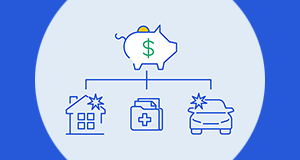How Much Money Should Be in an Emergency Fund

Summary
Wondering how much money should be in an emergency fund? Learn how to calculate your emergency savings goal, even if you're starting small or managing debt.
In this article:
Sudden job loss, unexpected home updates or emergency car repairs are realities for most people at some point. You can avoid unwanted debt and feel more at ease by building an emergency fund with back-up cash for those just-in-case moments.
However, saving up over several months might seem a little overwhelming, especially if you don’t know how much to save in the first place. The right amount for your emergency fund depends on your budget and lifestyle. What’s right for one household might not be right for another — and that’s OK.
Let’s discuss common tips for building your emergency fund amount, so you can get one step closer to reaching important financial goals.
What is an emergency fund?
An emergency fund is money you set aside specifically for unexpected expenses — like a pet emergency, flooded basement or flat tire. You might put funds in a savings account or a separate checking account to distinguish it from the money you use for everyday expenses. Wherever you keep your emergency fund, the important thing is that the money is safe and easily accessible when you need it.1
How much should you try to save in an emergency fund?
A general guideline for your emergency fund is to aim to save three to six months’ worth of essential expenses.2 These typically include:
- Rent or mortgage
- Food
- Utilities
- Medications
- Transportation
- Credit card or loan payments
- Car insurance
- Health insurance
Start doing the math by calculating all your monthly expenses. Once you have the total amount you would need to get by, multiply that by the number of months you’d like to cover with your emergency fund.
For example, if your monthly expenses total $2,500, your emergency savings goal could range from $7,500 (three months) to $15,000 (six months) or more.
Saving three to six months of expenses is a good goal, but it’s not a hard-and-fast rule. If that seems like a lot to save, keep in mind that you don’t have to fully fund your emergency savings overnight, and any amount you can save may help when an unexpected bill pops up.
An emergency fund isn’t one-size-fits-all
Different emergencies come with different price tags. Think about what you would do if you needed to buy a new car so you could drive to work or if you lost your job and couldn’t find a new one right away. These would be more expensive emergencies that could require more savings. On the other hand, a broken washing machine might be an emergency you could fix for less than $1,000.
Your emergency needs might be different based on factors like:
- Your family and lifestyle: If you take care of a chronically ill family member or have older relatives who live far away, there may be a higher chance you’ll need to handle a medical or travel-related emergency. And if you’re considering a life change — like leaving a partner — it may be wise to build a larger emergency fund to cover expenses like temporary housing, caregiving responsibilities or time away from work.
- Your job stability: If you work in a steady field and have a long and consistent work history, you may not need to save as much as others. If you’re a freelancer or work in an industry with an unpredictable income, you may want to save more to build a safety net.
- Your household size: If you have more dependents, you may have more potential emergencies, like unexpected childcare costs or school-related expenses. If you live alone, you might have fewer expenses to cover.
- Your comfort level: Depending on your lifestyle and how much you already have saved, you might feel better saving for more than three to six months of expenses, or you might be comfortable with saving a bit less.
How much should you save if you’re managing debt?
If you’re focused on paying down high-interest credit card debt, loans or other bills, not having emergency savings could lead you to rely on credit when unexpected expenses come up. Some financial experts suggest starting with a smaller emergency fund amount, like one month’s worth of expenses, if you have consumer debt.3 Consumer debt is money you borrow to pay for personal or household expenses, like credit cards, student loans, car loans or a mortgage.4
Since consumer debt requires you to pay interest on top of what you’ve borrowed, it may be smart to focus on paying down the balances using some of what you would have preferred to put in the emergency fund. Remember, even having a small emergency cushion can make a crisis feel more manageable.
Build your emergency savings one dollar at a time
Building an emergency fund doesn’t happen overnight — and it doesn’t need to. Whether you’re starting with $100 or working toward six months of expenses, every bit you save helps you feel more prepared and less stressed when life throws you a curveball. The most important step is just getting started.
And if you’re facing an unexpected expense and don’t have savings built up yet, there are still ways to get money in an emergency. OneMain offers emergency loans with fast approval times that could help you cover costs in the short term while you create extra breathing room.
Sources:
1 https://www.consumerfinance.gov/an-essential-guide-to-building-an-emergency-fund/
2 https://www.bankrate.com/banking/savings/emergency-savings-report/#tips-on-building-your-emergency-fund
3 https://www.bankrate.com/banking/savings/these-guidelines-will-help-you-decide-whether-to-pay-down-debt-or-save/#how-much-should-i-save
4 https://www.investopedia.com/terms/c/consumer-debt.asp#:~:text=Consumer%20debt%20refers%20to%20personal,%2C%20auto%20loans%2C%20and%20mortgages.
This article has been updated since 2022. Andrea Hoyt and Kim Gallagher contributed to this post.
This article is for general education and informational purposes, without any express or implied warranty of any kind, including warranties of accuracy, completeness, or fitness for any purpose and is not intended to be and does not constitute financial, legal, tax, or any other advice. Parties (other than sponsored partners of OneMain Financial (OMF)) referenced in the article are not sponsors of, do not endorse, and are not otherwise affiliated with OMF.



